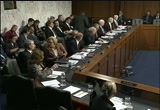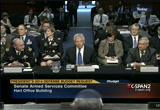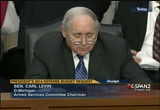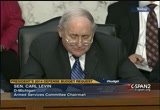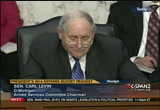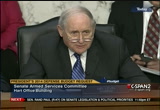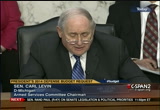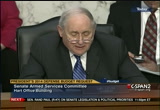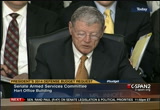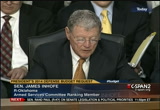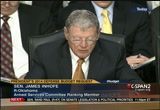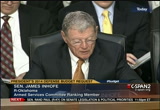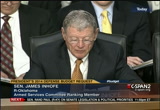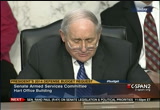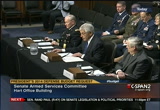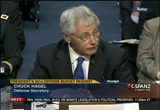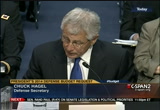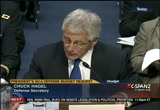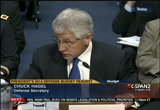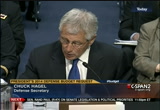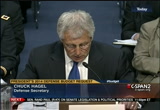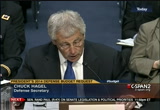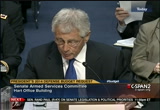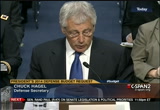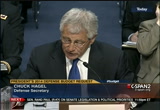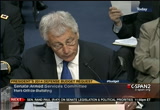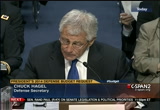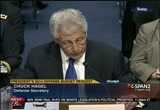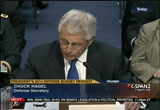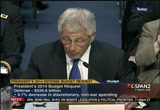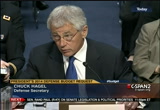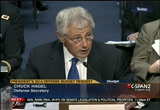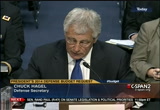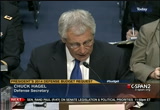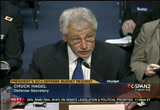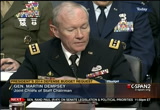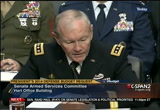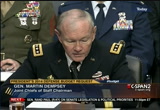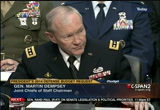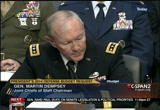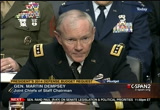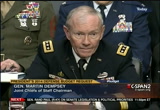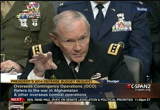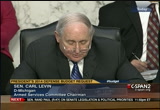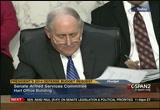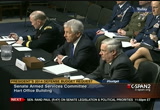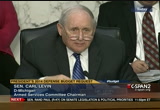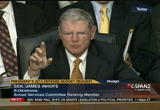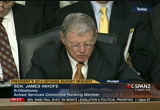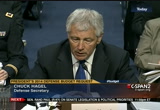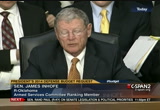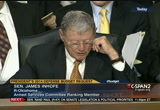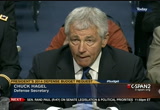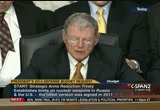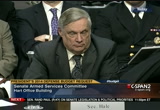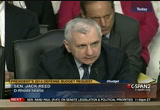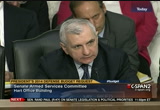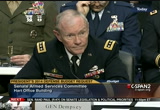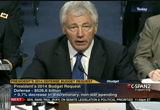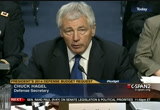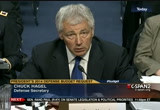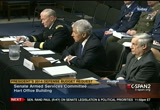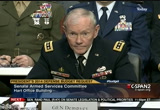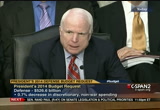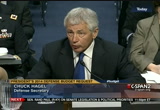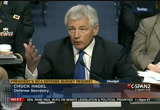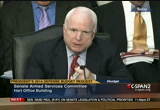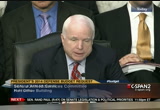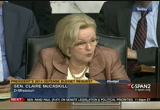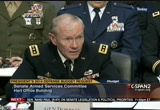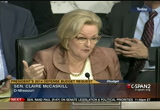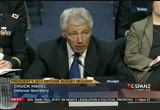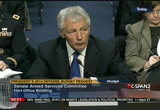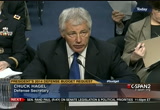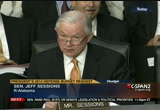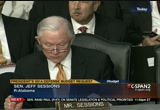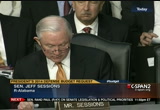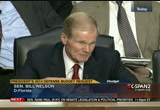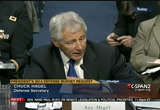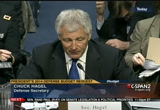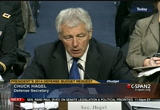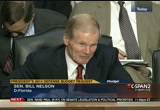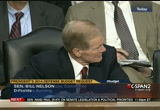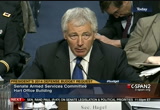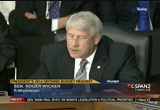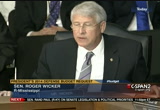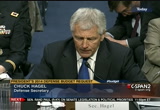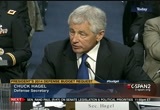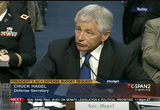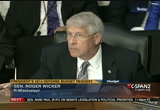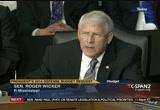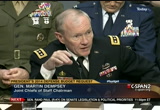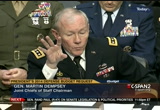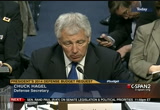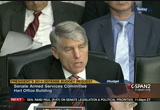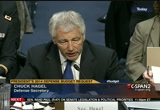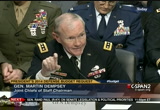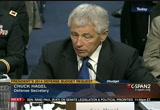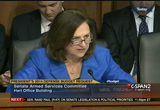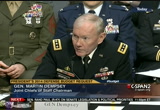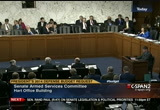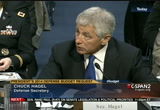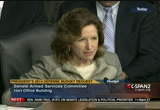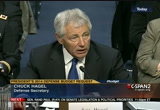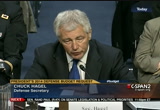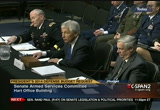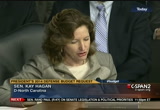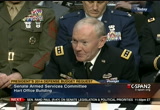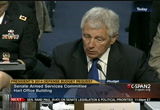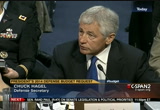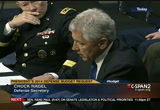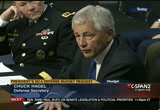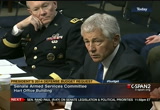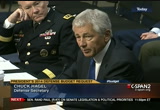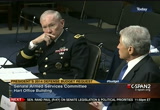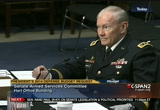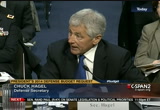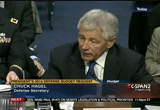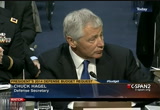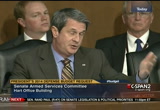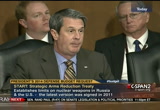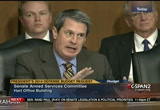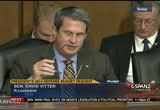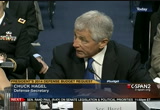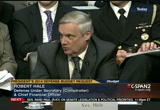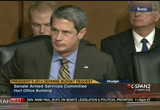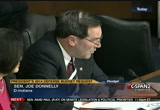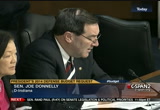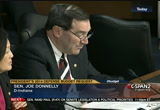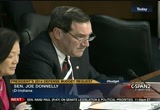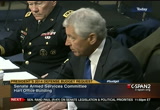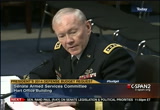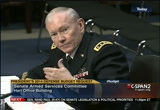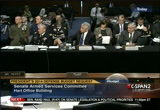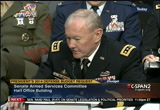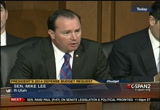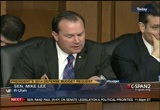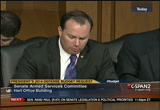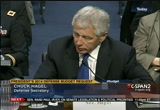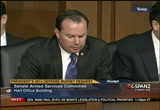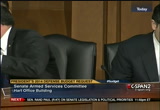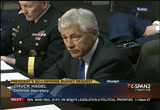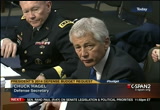tv Tonight From Washington CSPAN April 17, 2013 8:00pm-11:00pm EDT
8:00 pm
the growing number of questions. [laughter] i'll try to deal dwsh i like how you answered direct and don't go on. [laughter] we'll keep firing away. >> i have not learned that enough yet. [laughter] >> yeah, what is the administration doing to address the discriminatory barriers facing people in recovery with criminal -- with a criminal justice history? >> that's a huge issue, and i actually could go on and on gout that one. it's the stigma. it is just -- i don't know anyone in the room who i have met traveling on behalf of the president for four years who has not been permly impacted by addiction. it's a friend, it's a coworker, it's themselves. it's a neighbor. it's so important that we remove that stigma because when i went back, and if you remember, i mentioned the 22 million people who could use some type of
8:01 pm
substance abuse prevention, many don't get treatment because of the stigma and feel they don't have a problem. the more people like devin, the more people who speak out about their particular problem, i would just shout out to faces and voices of recovery, the more people that talk about this, i think, the more that the problem will kind of come out from behind the shadows. ..
8:02 pm
hair services and also recognizing having met so many people that it's a hard job every day of the week. >> defense secretary chuck hagel and joint chiefs of staff's general martin dempsey testified before the senate armed services committee on the defense department 2014 budget request. the pentagon budget request includes almost $527 billion in discretionary spending nearly 1% decrease from 2013.
8:03 pm
this is three hours and 45 minutes. >> good morning everybody. chuck hagel, general martin dempsey the chairman of the joint chiefs of staff, accompanied by the department's comptroller undersecretary bob hailed for her hearing on department of defense fiscal year 2014 budget request and the posture of the u.s. armed forces we welcome secretary hagel on his first appearance as secretary of defense before this committee. we thank all of our witnesses for their service to our nation and to the soldiers sailors airmen and marines at home and in harm's way. we could never say that enough.
8:04 pm
your testimony today is a key component of the committees review of the fy2014 budget request for the department of defense. this year's request includes $526.6 billion for the base budget and $88.5 billion for overseas contingency operations for oh although as your testimony notes the oco number is a placeholder figure pending final force level of deployment decisions. the future defense budget meeting congress's failure to enact legislation reducing the deficit by $1.2 trillion is required by the budget control act. as a result of that the dod funding for fy2013 was reduced by sequestration and the amount
8:05 pm
of $41 billion unless congress acts, the fy2014 dod budget will be cut by an additional $52 billion below the funding level which is in the president's budget for fy2014 and also the budget passed by the house and senate of representatives. weekend fix the budget that reduces the deficit by $1.2 trillion over 10 years and that would take a grand bargain including spending cuts and additional revenues. would turn off the automatic spending cuts and sequestration for those 10 years. i remain hopeful we can develop such a bipartisan plan but absent a so-called grand bargain, surely we could devise a balanced deficit reduction package for one year that avoid sequestration in fy2014. we simply cannot continue to ignore the effects of
8:06 pm
sequestration. sequestration will have a major impact on military personnel. the pay of military personnel has been exempt it will ask them -- for troops including schools, military children, family support programs and transition assistance programs and mental health and other counseling programs. the president's budget request continues the measure drawdown of active duty and present and strength. we have in recent years given the department numerous force shaping authorities to allow us to reduce the debt strength in a responsible way, ensuring that the service maintains the proper enforcements and avoid grave and occupational disparities all of which have long-term effects. if sequestration continues the result would be more precipitous reduction even with a four structure that is out of sync
8:07 pm
with the requirements of our defense strategy. sequestration has already affected military readiness. we have heard testimony that is result of cuts to flying hours, and other training activities and testimony that readiness will fall below its levels for all three military services by the end of this summer. the army for example says about the end of september only one third of its active-duty units will have acceptable readiness ratings far below the two-thirds level that the army needs to achieve to meet national security requirements. these cuts are having an operational impact as well. for example for fixed -- in the deployment of their truman carrier group to the persian gulf has been postponed indefinitely. it will cost us billions of dollars and months of efforts to
8:08 pm
make up for the shortfalls in training and maintenance and it will be nearly impossible for us to do so if we have a second round of sequestration in fiscal year 2014. our men and women of the military and their families should not have to face both the pressure of military service and the uncertainties of future financial support from their government. the department faces budgeting shortfalls at a time when 68,000 u.s. troops to remain in harm's way in afghanistan. we must above all ensure that our troops in afghanistan have what they need to carry out their mission, to campaign in afghanistan is now on track to reach a major milestone later this spring when the lead for security throughout afghanistan will transition fully to afghan security forces. as our commander in afghanistan told us yesterday there are clear signs the afghan security
8:09 pm
forces are capable of taking the fight to the taliban and their doing so effectively. operations i afghan security forces are increasingly conducted by afghan units on their own. that is, without international horses presence. there are fewer afghan civilian casualties in recent months and fewer u.s. coalition casualties including a four-week stretch earlier this year with no u.s. or coalition fatalities. the departments budget challenges which are the subject of today's hearing are occurring in a world full of stress to u.s. security including north korea's reckless rhetoric and provocative behavior and perhaps the greatest world threat iran's nuclear program and its support for international terrorism. in the interest of time i'm going to submit the remainder of my statement relative to those and other matters to the record. we will have a as each of us of
8:10 pm
us was no decide we will have a separate hearing on the growing bloodshed in syria after the conclusion of this morning's session. we will take a half hour break and then we will return to hear from our witnesses about the situation in syria. secretary hagel, general dempsey undersecretary hail we look forward to your testimony and i now call an on senator inhofe. >> thank you mr. chairman. i welcome our guest and especially my friend former senator hagel. we worked together for a long period of time and had differences in opinions that always remain good friends. we face unprecedented challenges categorized by escalating threats and growing budget crises here at home. unfortunately the budget before us today is symbolic for its lack of presidential leadership necessary to overcome the unprecedented challenges facing
8:11 pm
our military and most troubling the budget does not even acknowledged the mandatory cuts associated with sequestration in fiscal year 14 much less to propose a plan to replace the cuts that can pass congress. this isn't a new phenomenon. the defense budget uncertainty has become a hallmark of this administration and if you want to get into more detail-authored peace and more detail that got -- isn't a lot more detail. the president has already cut $600 billion from our military at a time nonsecurity and this is significant nonsecurity-related domestic security has increased by nearly 30%. the chairman of the joint steve chiefs of staff recently testified after absorbing over $400 billion in cuts the military cannot afford to give another dollar if they are to maintain current capability. our military leaders are warning that we are creating a hollow
8:12 pm
course unprepared to respond to contingencies around the world yet according to the fy14 budget request the white house now feels we can cut another $120 billion. we are at the point in our nations history where our national military is no longer guided by the threats we face or an honest assessment of the resources needed to protect our critical interest. instead the discussion washington has centered around how we can, how deeply we can cut defense. our forces are now being asked to do more with less training, less equipment and less capability assessing the increased risk on the battlefield and increased risk of our servicemen and women making the sacrifice and this is an acceptable in the fiscal year 14 budget. i think chairman levin said it
8:13 pm
very well and talking about the dilemma we are facing in our armed services. at a time when our intelligence tells us we face the most crestor nation security in recent history we are poised to strike defense budgets by over a trillion dollars over the period of time. we have made this mistake before and the military drawdown to the 1970s and 1990s that left this country with the military too small to meet the instability and rising threats of a changing world. we need to stop this stupid argument that runaway defense spending is what is driving our economies, our countries unsustainable debt. it's disingenuous and more importantly it's just wrong. defense spending accounts for approximately 18% of the federal spending annually while nonsecurity mandatory spending accounts for 60%. we are on a path where an
8:14 pm
insatiable appetite to face domestic spending in mandatory programs are consuming our defense budget and will soon result in a hollow military. the commander-in-chief must take a lead in restoring certainty to our budgeting process to ensure that our military leaders have appropriate resources to develop and execute plans and manage the department of defense efficiently. i've repeated the warnings of admiral cindi wind field the vice chairman of the joint chiefs many times over the last three months and this quote is an accurate cole which he is referring. quote i know if of no other time in history when we have competent julie down this far this fast and the defense budget. there could be for the first time in my career instances where we may be asked to respond to a crisis and we will have to say we cannot do it.
8:15 pm
we have to correct this mr. chairman. thank you. >> thank you very much senator inhofe. secretary hagel, welcome. >> mr. chairman thank you and two ranking member inhofe no members of the committee thank you for an opportunity to appear before you this morning. >> i'm going to interrupt you before you get started because we have a quorum and that means we we now can consider list of pending military nominations and i know you would want us to do that so i will now ask our committee to consider 549 pending military nominations including, included in the list the nomination of general breedlove to the commander u.s. european command and supreme allied commander europe and of these nominations 311 are one day short of the committee's requirement for seven days before report them out.
8:16 pm
no objection has been raised to the nominations and i recommend that we waive the seven day rule in order to permit confirmation of the nominations of these 311 officers as well as the others. is there a motion to report? is their second? all in favor say aye. opposed nay. the ayes carry. >> is the hearing over? >> it is. [laughter] at least to the 549 nominees it's over. >> and efficient committee. thank you. i know general dempsey and all of us are very pleased without action as well will be our members of our team so we appreciate your deliberation and your action. mr. chairman before i begin my formal presentation which you have doubted i have a longer version distributed last night in committee with members on the
8:17 pm
fy2014 budget. let me say on behalf of the men and women that represent our armed forces both in uniform and civilians that our prayers and hearts go out to the people in boston, the families who lost loved ones, those who were injured, wounded by this despicable act. we are very proud of how our leaders and those responsible for assisting and dealing with the tragedy in boston, how have responded. wewe are particularly proud of r national guard who are still working with local officials so i wanted to put that on the record mr. chairman and make that a considerable know. >> we thank you so much for that and our sympathy was respected
8:18 pm
in the hearing we had yesterday and we certainly join you in your sentiments. >> thank you. allow me first to express my appreciation and that of the department defense, this committee in each of its members for its continued support of our men and women in uniform and our civilian workforce. they are doing tremendous work mr. chairman and senator inhofe as you have both noted and they are making great sacrifices along with their families, as they have for more than 11 years of our nation being at war. their dedication and perfection was marred the foundation of our military strength. as we discussed numbers, budgets and strategic priorities this morning we will not lose sight of those men and women serving across the globe. as you all know there will being depends on the decisions we make in washington. today the department of defense
8:19 pm
faces a significant challenge of conducting long-term challenge budgeting at a time up in security in terms of the security challenges we face around the globe in the levels of defense spending at home. even as the military emerges and recovers from more than a decade of sustained conflict in iraq and afghanistan, we confront an array of complex threats with varying degree to include the persistence of violent extremism throughout weak states and ungoverned states in the middle east and north africa. the proliferation of dangerous weapons and materials, the rise of new powers, the risk of regional conflicts in the united states faceless nameless silent and distracted cyberattacks, debilitating dangerous curse of human despair and poverty as well as the uncertain
8:20 pm
implications of the environment of degradation. meanwhile the face of technological change and the spread of advanced military technology to state and nonstate actors poses an increasing challenge to the united states military. this is the strategic environment facing the department of defense as it enters a third year of flat declining budgets. the onset of these these resource constraints hazarded lead to significant and ongoing belt-tightening and military modernization force structure personnel and overhead expenditures. you have noted some of those mr. chairman. it has also given us an opportunity, an opportunity to to reshape the military and reform defense institutions to better reflect 21st century realities flexibility agility. the process began in the leadership of secretary gates who canceled or curtailed more than 30 modernization programs
8:21 pm
and trimmed overhead costs within the military services and across the defense enterprise. the realignment continued undersecretary panetta who worked closely with the president and the joint chiefs of staff to craft new defensed her teacher guidance and the fy2013 defense budget plan which reduce the top line by $487 million over the course of a decade. the presence request of $526.6 billion in the department of defense base budget for fy2014 continues to implement the president strategic guidance and enhances the department's effort toward institutional reform. most critically it sustains the quality of the all-volunteer force and the care we provide our servicemembers and their families which underpins everything we do as an organization. before discussing the particulars of this budget request however allow me to address the profound budget problems facing the department
8:22 pm
in fy2013 and beyond. as a result of sequestered. the congress and the department of defense have a responsibility to finance -- financers together because we have a shared responsibility. we have a shared responsibility to protect our national security. dod is going to need the help of this committee. we are going to need the help from congress to manage this uncertainty. the fy2013 dod appropriations bill enacted by congress last month addressed many urgent problems by allocating dod funding more closely aligned with the president budget request. if the department authorities start new programs and allow us to proceed with important military construction projects. nonetheless the bill still left in place a deep and abrupt cuts associated with sequestered. as much as $41 billion in spending reductions over the next six months.
8:23 pm
military pay and benefits are exempt as you have noted mr. chairman. they are exempt from sequestered and we made a decision to shift the impact of sequestered from those serving in harm's way. furthermore the military's experience hiring operating transportation costs than expected when the budget request was formulated more than year ago. as a result he these factors the department is facing a shortfall in our operation and maintenance accounts for fy2013 at least $22 billion in our base budget for active forces. in response the department has reduced official travel cut back sharply on facilities maintenance imposed hiring freezes and halted many other important but lower priority activities. however we will have to do more. we will have to do much more. we will send to congress a large reprogramming request designed to offset some of our
8:24 pm
shortfalls. especially shortfalls in wartime funding and we ask your help with a. >> review and approval. this free program will be limited by ceilings on transfer authority so can only solve some of our problems. we will have to continue to consider furling civilian personnel in the months ahead. there will also be significant cuts in maintenance and training which further erodes the readiness of the force and will be costly to regain in the future. as the service chiefs have said we are consuming meanwhile investment accounts in the industrial base are not spared damage as we also take indiscriminate cuts across these areas in the budget. we continue to need a strong partnership of this committee to help us address the shortfalls. if the related provisions of the budget control act of 2011 are not changed fy2014 funding and the the national defense programs would be subject to a steeply reduced cap which would
8:25 pm
further cut dod funding by roughly $52 billion if there is no action for the congress and the president roughly $500 billion in reductions to defense spending would be required over the next nine years. as an alternative the budgets proposal proposes a hundred 50 and $50 billion in defense savings over the next decade. these are part of a balance -- these cuts are largely occurring mainly in the years beyond fy 2018. that gives the department time to implement these reductions carefully responsibly by the strategic guidance. let me turn to the detailed budget request for fy2013. the $526.6 billion fy2014 budget request continues to balance a compelling defense and
8:26 pm
supporting our troops in afghanistan protecting readiness modernizing the military's aging weapons inventory in keeping with the president strategic guidance and sustaining the quality of the all-volunteer force. today's budget request also contains a placeholder request which you have noted mr. mr. chairman for overseas contingency operations, oco at the fy2013 level, $88.5 billion. the submission does not include a formal request because afghanistan force levels and deployment decisions for this year were delayed in order to provide commanders enough time to fully assess responsibilities and requirements. who will soon be submitting an oco budget amendment with a revised account level detail. the base budget being presented today continues the department's approach over the last several years and growing costs in the areas of support acquisition and pay and benefits.
8:27 pm
before cutting military capabilities and force structure. this budget identifies new savings of 34 billion in fy2014 through 2018 including 5.5 billion in fy2014 from these areas. in order to maintain balance and readiness the department of defense must be able to eliminate infrastructure as it reduces force structure. the dod has been shedding infrastructure in europe and shedding infrastructure in europe for several years and consolidating that infrastructure. undertaking a review of our european footprint this year. we also need to look at our domestic footprint. therefore the president's fy2014 request authorization of base realignment and closure in 2015. brac is a comprehensive and fair tool that allows communities to
8:28 pm
have a role in the reuse decisions for their aunt development assistance. brac as we all know is imperfect and there are upfront cost to brac. the future defense program as $2.4 billion to pay for those costs but in the long-term there are significant savings. the previous rounds of brac or saving $12 billion annually and those savings will continue. the department continues to streamline its acquisition programs and processes and over the past four years we have realized significant cost savings as a result of reforms and permitted by the weapon system and acquisition reform act in 2009 sponsored by chairman levin and senator mccain. in this budget the department has also achieved 8.2 billion in savings for weapons program terminations and restructure. for example by revising the
8:29 pm
acquisition strategy of the armies ground combat the haggle the department will save over 2 billion in developing cost. another case the department used evolutionary approaches to develop new capabilities instead of relying on technology. the cost of military pay and benefits are another significant driver of spending growth that must be addressed in the current fiscal environment. in this budget the departmendepartmen t is substituting a new package of military compensation proposals to take into consideration congressional concerns associated with those from fy2013. these changes save about 1.4 billion in fy2014 and a total of 12.8 alien and fy2014 through 2018. this package includes a modest slowing of the growth of military pay implementing a 1% pay raise for servicemembers in 2014. the department is seeking additional changes to the
8:30 pm
tricare program to bring the beneficiaries costs closer to levels envisioned when the program was implemented. particularly for working age retirees. survivors and military members who died in active duty or medically retired members will be excluded from all tricare increases. even after the proposed changes tricare will still remain a very substantial benefit. these pay and benefits were among the most carefully considered and the most difficult choices in the budget. they were made with strong support of the joint chiefs of staff and the senior enlisted leadership in recognition that in order to sustain these benefits over the long term without dramatically reducing the size of readiness of the force these rising costs will need to be brought under control. nevertheless spending reductions on the scale of the current
8:31 pm
drawdown cannot be implemented to improve efficiency and reducing overhead alone. cuts and changes to capabilities, force structure modernization programs will be required. the strategic guidance issued in january 2012 set the priorities and parameters to inform those choices. the fy2014 budget commission further implements program alignment to the strategic guidance. the new strategy calls for smaller, leaner more agile more flexible force. last year we proposed reductions of about 100,000 in military end strength between 2012 and 2017. most of those reductions occur in the ground forces and are consistent with the decision not to size u.s. ground forces while maintaining adequate capability should such activities again be required. by the end of 2014 we will have completed almost two-thirds of the drawdown and the drawdown
8:32 pm
should be fully complete by fy2017. increased emphasis on the age of the middle east represents another strategic guidance. this budget continues to put framing on a deployable self-sustaining force such as long-range bombers and carrier strikers. they all project over great distances and carry out a friday of complicated missions. this new strategy leverages new concepts of operation enabled by advances in space cyberspace special operations global mobility precision strike missile defense and other capabilities. by making difficult trade-offs in lower priority areas the fy2014 budget protects or increases key investments in these critical capabilities. another area focus in this budget request to sustaining the readiness and quality of the all-volunteer force. the high-quality of our all
8:33 pm
volunteer corps force continues to be the foundation of our military strength. bfi 2014 budget includes -- for military personnel as well as 49.4 billion for military medical care. together these make up roughly one third of our base budget. this budget seeks to ensure that her chips receive the training and the equipment they need for military readiness and a world-class support programs they and their families have earned and deserve. the department continues to support key provisions and programs in fy2014 to support servicemembers and their families, spending 8.5 billion on initiatives that include transition assistance and veteran employment insurance, behavioral health, family readiness, suicide prevention, sexual assault prevention and response. the fy2014 budget is a reflection of dod's best efforts
8:34 pm
to match ends ways & means during a period of intense physical uncertainty. it's obvious that significant changes mr. chairman are the required changes to this but a plan. the department must plan for any additional reductions to the defense budget that might result in congress and the administration agreeing on a deficit reduction plan. it must be prepared in the event that sequester level cuts present and heavier over the long-term. consequently in order to assess the potential impact of further reductions to a level of full sequester. the purpose of this review is to reassess the basic assumptions that drive the department investments and force structure decisions. the review will identify strategic choices in further institutional reforms that may be required including those reforms which should be pursued regardless of fiscal pressures.
8:35 pm
it is designed to help understand the challenges articulate the risks and look for opportunities for reform and efficiencies presented by resource constraints. everything will be on the table during this review. roles and missions planning business practices force structure personnel compensation acquisition and modernization investments, how we operate, how we measure and maintain readiness. this review is being conducted by debbie secretary of defense carter with general dempsey. service secretary service chiefs office of the secretary of defense principles combatant commanders will serve as the central participants. our aim is to include this review which is now underway by may 31. the results one former fy2015 budget request and will be the foundation for the quadrennial defense review doing congress in february of next year. it is already clear to me mr. chairman that achieving
8:36 pm
significant budget savings without acceptable risk to national security will require not just tweaking or chipping away at structures and practices but if necessary rationing entirely new ones to better reflect 21st century realities and that will require the partnership of congress. the fy2014 budget and the ones before it made hard choices. in many cases modest reforms personnel and benefits along with efforts to reduce infrastructure and restructure programs the fierce political resistance were not implemented. we are now in a completely different fiscal environment dealing with new realities that will force us to fully confront these tough and painful choices. and to make the reforms we need to put this department have to sustain or maintain our military strength for the 21st century. in order to do that we will need flexibility, time and some budget certainty.
8:37 pm
we will also need to fund military capabilities necessary for the complex security threat in the 21st century. i believe the president's budget does that. with the partnership of congress the defense department can continue to find new ways to operate more affordable efficient land effectively however multiple analyses show additional major cuts especially those on the scale of timeline of sequestration would require dramatic reductions to support military capabilities for the scope and activities of our world. mr. chairman that completes my formal remarks and as i said i have more detailed reports that i have submitted for the record and i appreciate the time of of of the committee of torture questions. now i would like to hear from chairman dempsey. >> thank you very much secretary hagel and your full statement will of course be part of the record. general dempsey. >> thank you chairman levin and ranking member i would like to
8:38 pm
add my thoughts and prayers as the secretary mentioned to those affected by the terror attack in new york city, boston rather and tell you how proud we are for guardsmen who were among the first responders and of course we will stand ready all of us to provide whatever support they need as the issue of. i welcome this opportunity to update you on the united states armed forces and to comment on the budget proposal for fiscal year 2014. this hearing comes at a time of extraordinary uncertainty as resources are declining and the risks to our national security are rising. it's in this context i offer my perspective on how we can work together to sustain a balanced and imperialist joint force. one thing you should be certain of and that is that our men and women are steadfast in their courage and their devotion to duty. i saw it recently in their eyes as i had the honor of reenlisting some of them at the
8:39 pm
bagram airfield. in afghanistan and our forces are simultaneously fighting transitioning and redeploying. afghan military as the secretary said will soon take operationally for security across the country. as they gained confidence so too to the afghan people. the coalition will remain and support as we transition to sustainable presence beyond 2014 and at every point along the way we must make sure that our force levels match the mission that we ask of our men and women in uniform. our joint force have been vigilant elsewhere as well. we are assuring our allies that basic provocation by north korean and iran working with their interagency partners to defend against cyberattacks and acting directly and with partners to defeat al qaeda. we are rebalancing the asia-pacific region and adapting our force posture to a new normal for the combustible violence in north africa in and the middle east and as we discuss more later today we are working with others to keep
8:40 pm
serious complex conflict from destabilizing the region. we are prepared with options if military force is called for in and can be used effectively to secure our interests without making the situation worse. we must also be ready with options for an uncertain and dangerous future and this but shift was purposely built to keep our nation immune from coercion. it aims to restore versatility to a more affordable joint force in support of our defense strategy but let me also be clear about what this budget does not do. this budget does not reflect the full sequestration amount. it does impose less reduction and gives us more time however uncertainty does persist about what the topline will be for this or any other budget. nor does this budget includes funds to restore -- though we don't know the full impact of the cost to recover from the readiness shortfalls we are experiencing this year. as expected we have already
8:41 pm
curtailed or cancel training for many units across all forces those not requiring to be deployed and we know it's more expensive to get ready than it is to stay ready. recovery cost therefore will compete with the cost of us building the joint force. this budget does however invest in our priorities. he keeps the force imbalance and supports are forward-deployed operation to help those emerging capabilities notably cyber. it funds conventional maker capabilities that are proven so essential to our defense. it also lowers manpower costs reduces excess infrastructure and makes health care more sustainable. most important protects our investment in our real decisive decisive -- which is or people. it treats the best best led thet trained and best equipment as nonnegotiable and impaired. never as a nation sustain such a lengthy war solely for the service of the all-volunteer force.
8:42 pm
we must honor our commitments to them and their families and for many veterans returning home there's a new frontline in a stronger with wounds seen and unseen pietri must continue to invest in the world-class treatment for mental health issues traumatic brain injury and combat stress and we also have a shared responsibility to address the urgent issue of suicide with the same devotion we have shown to protecting the lives of those in combat. the risks inherent to military service must never include the risk of sexual assault. sexual assault betrays the trust on which our profession is founded. we will pursue every option should drive this crime from our ranks. this isn't a -- for our military. our warriors will to win is on daunting but the means to prepare to when are becoming uncertain. we therefore have an opportunity and an obligation with this in any future budget to restore confidence. we have it within us to stay
8:43 pm
strong as the global leader and a reliable partner. the joint forces looking to us to lead through this period of historic fiscal correction but we can't do it alone and as i have said before we need budget certainty and we need time and flexibility. that means predictable funding stream. it means the time to delivery evaluate trade-offs for structure compensation and readiness and it means a full-fledged ability to keep the force imbalance. thank you for all you have done to support our men and women in uniform. i only ask that you continue to support a responsible investment in our nations defense and i look forward to your questions. >> general thank you so much. secretary paled to have a comment? >> we are going to have a seven minute first-round and that may be likely be the only round given the large number of senators that are here today. let me start first with you a general dempsey.
8:44 pm
do you personally support the request for the department of defense budget for fy14? >> i do and you know whether the chief shares your view, they do. we heard yesterday general that quite an optimistic assessment of the security situation in afghanistan, more optimistic than in previous years and we have heard that from our commander there chock-full of -- general dunford and i wonder if you share the generally optimistic assessment that he heard? >> i was with general dunford and his subordinate commanders about two weeks ago and i will say my impression after visiting some of the operational coordination centers where for the first time i've seen the afghan government actually applying some of their instruments and governance and economic factors into security does lead me to be more optimistic than i have been in
8:45 pm
the past where i felt like we have been doing a good job but not necessarily that they have been shouldering as much as the verdon as they need to shoulder. >> have you reached a conclusion as to the troop level which you will recommend to the president for the post-2014 period? >> no we have not senator. we as you know i said at a previous hearing that the target that nato has established or the range let's call it that nato has established, it needs to 12,000 seems to be a reasonable target that we haven't selected a specific target. >> is at a target for u.s. forces? >> that would be isaf but that is part of the mission related to training advising and assisting. >> all right so the president has made it -- not made a decision yet, is that correct? >> that's correct. >> in terms of the reduction
8:46 pm
between now and 2014 the president announced plans to drive down 34,000 of the 66,000 troops in afghanistan by february 2014. is it true that the case of that drawdown will affect the oco funds needed and when they are needed? >> i'm sure it will and that is the reason i think mr. hale would agree that the oco budget has not been submitted yet. what we have done is given the commander in the field the flexibility to plan that reduction which by the way i think is very important to allow him to plan that pays and manage the equilibrium between fighting transitioning in redeploying but i think that is why the oco budget is delayed. >> of the commander has the flexibility, as soon as we
8:47 pm
presumably learn from the commander how to exercise that flexibility then we will determine the oco? >> that would be my understanding of the sequence. >> for the record secretary hale, not now but in time would you tell us how the pace as is determined by the commander, the commander has the flexibility will affect the oco just for the record? >> we are make in assumptions on oco. >> in this budget the secretary of certain amounts that are going to be utilized for our missile defense. there has been an announcement and i believe you were the one who made it that we are going to deploy 14 additional ground-based interceptors in alaska.
8:48 pm
we have made a decision relative to the final phase of the adaptive approach which has been adopted for nato and i'm wondering, let me ask you general. do you personally support the missile defense approach that has been decided upon by the administration? >> i do. it's in response to what we perceive to be an increasing threat and that includes both sides of the missile defense approach that i just identified. one is the modification and the face adaptive approach but also the additional ground-based interceptors in alaska, both pieces? do you approve of bart's? >> i do. >> on the brac issue as i understand your testimony and your budget mr. secretary, there
8:49 pm
is a short-term cost if there were an additional brac approved but that cost is not in the 2014 budget request. you put it in the 2015 budget request, is that correct? >> the money is actually 2016 through 18. >> but the additional upfront funding, the cost of the brac is not provided for in the 2014 budget request? you said you were going to make a provision in 2000 teen. >> 2015, 16 and 17. >> we are not requesting it until 2015 so we put the money in the out-years. >> so there is no money this year. we met at the pentagon a few days ago i guess.
8:50 pm
we discussed and there were a number of us who were there. we discussed the point that you made about alleged savings from the last rack round and today you indicated that previous rounds and perhaps the previous round you testified you save $12 billion annually. is that the savings that you saved created from the last round or from all the previous rounds? >> all the rounds and if you would like more detail mr. hale will break that out. >> can you give us that for the record i think that is a detail we would need for the record, round by round and i think that is my time so we will call on senator inhofe. >> thank you mr. chairman and since we are on the subject of brac i think you might remember secretary hagel but you were in
8:51 pm
the senate at the time in 2005 and you might remember i led the opposition unsuccessfully i might say and attorney of that was my senior senator john nicholas was on the other side and we lost by two votes. the reason -- >> you are not going to hold that against me. >> i don't amber how you voted on it. >> i support barack. >> okay. i supported some of them in the past and i oppose the one in 2502 reasons. one is that it was bringing down our infrastructure to an artificially low size to meet what i thought was an unacceptable force and that was one reason of that time. the other reason is what the chairman testified on here and that is that there is a cost to brac into different areas. one is in the initial cost and
8:52 pm
the other is the recurring cost. now the government according office seven years after the 05 rack round noted that the one time implementation cost grew from 21 billion to 35 alien, an increase of $14 billion. as a result of the 20 year -- getting into the recurring cost the 24 value expected to achieve from the 2005 round decreased by 72% and additionally 75 out of the 182 recommendations, about 41% are now expected to result in a negative 20 year value. that means it will cost more to implement than any projected savings over a 20 year. math. that is pretty bad.
8:53 pm
and i have seen this and i know there are ways to employ projected figures. those are the figures that came from the jal office just last year so with that in mind recognizing as you point out we may not feel this until 2015, if no reason to believe we will be in a lot better shape and 2015 than we are today and if we consider that in your support of this rack round. >> i've not seen the figures of the study you referred to senator. i do know and i will respond to your question but i think from the same gao report or another one noted in the 2005 brac round it clearly reflected i think the number was almost a 25% over capacity and infrastructure at the time in our facility.
8:54 pm
now, i will ask mr. hale to respond here quickly but to answer your question we have looked at all the factors, upfront costs. >> we don't need to hear from mr. hale now but if you will for the record secretary hale i know you have read the report i referred to and i ask that you would share that with secretary hagel which i'm sure he will want to look at and i would ask you to consider that because i think those reasons for my opposition to -- 8 years ago now are probably more true today. the chairman talked about the missile defense thing. i was very pleased when you made the decision to increase the number of ground-based interceptor sites on the west coast. i think that was good. what i don't agree with as has been pointed out that is
8:55 pm
probably a good thing to do in light of all the things happening in north korea. i was over there recently and in fact i talk to you over there and i realized that this is something that we need to protect against. i may not be in the majority appear but i said anything coming from north korea has the same capability. [inaudible] where i probably disagreed general dempsey with you is on our capacity and from the other side the east. that is the reason we were building the ground interceptor in poland and out we are talking about certain sites and i can quote several generals here. general -- for example said we are not in the most optimum posture to --
8:56 pm
threat in spite our intelligence has told us since 2007 that iran is going to have the capability of a weapon and delivery system by 2015. secretary hagel do you disagree with my concern over the threat that would come from the east as opposed to the west? >> no, i don't disagree. it's something the department of defense and all those responsible for missile defense capabilities and our strategies and tactics match those weapons in match those strategies are concerned with us well so it's a very real issue and one that we are dealing with and continue to do with it so it's like all of these issues, what should we be doing and what are we doing? >> one way to do with it is on the third site no one is talking
8:57 pm
about and i don't know whether you have taken a position on that or not but if you have what you let us know what that is? >> as you know we were instructed to the national defense authorization act to conduct impact statements looking at the possibility putting aside the east coast. that investigation in that study is underway and we should have a complete by the end of this year and we will obviously share that with congress. >> the last question i have mr. secretary has to do with the new s.t.a.r.t. treaty. the commitment was made by the president in order to get the votes necessary for that and those commitments have not been met. what i would like to get from you for the record and there wouldn't be time now, is, will you support the product that the
8:58 pm
president talked about in order to get the votes that he got for the new s.t.a.r.t. treaty, in other words building the capability? >> whatever commitment the president made i have course would support and carry forward my responsibilities in order to comply with those and the treaty. >> thank you. >> thank you senator inhofe. secretary hale on that gao report would you give us any differences that you have. not now but in the record with that gao report in addition to requests by senator inhofe? >> may i say quickly we don't intend to keep the 2005 round. it's very different than what we would do and 25th team. >> if you could give us your criticisms are disagreements. senator reid. >> thank you very much. the secretary mentioned his comments that we are facing a lot of short-run constraints, sequestration and other issues but longer-term there are issues
8:59 pm
that have to be dealt with regardless of the present dilemma with sequestration in the budget control act. one of the growing personnel force and particularly the health care force and i know you face proposals in the budget in that regard and i want to direct a question to general dempsey. it would seem to me in order to effectively carry out any reform there has to be an ongoing dialogue with active personnel and reserve personnel and that dialogue is conducted by uniformed military who shares the service and the sacrifice of these more than anybody else and is that dialogue going on. are there other ways organizationally to begin to save costs? any sort of path forward that we
9:00 pm
9:01 pm
well motivated, while schoolteachers are more of a fact there been other benefits. >> if i could reinforce that point. what it's crowded out of streaming. there's not so many constituent were recognized. when i talk to the force, i explained you don't want to be the best company to enforce on the planet, visiting at fort hood, texas or beauford, we've got to steepest imbalance. >> i appreciate that very much. last year we were able to route or a process where we were able to.a new technique of mail order
9:02 pm
and those are the types smart adjustments that might be more palatable and more acceptable and achievable. >> strictly changing coming you initiated a strategic review, indicating the chairman should look at it. any insights you have at this point and the obvious question. is the budget going to drive the strategy quite >> as i noted, in my statement, the budget obviously is the fact and all of this. not just fy 2013, which we are living through, which you understand what we are going through, but as we look in the future, what our strategic
9:03 pm
priorities? how do we defend the interest of our country? obviously, resources are critical. when i initiated to teach it management review, he was influenced by the budget. he is urgency of the budget, but more than not, the world is a different kind of world. you will travel, go everywhere. we have new threat, some of the same old threads. there is an online minute global affairs that we haven't seen since world war ii and never quite seen it the way it is. the question i has to ask as secretary defenses are we prepared and are we going to be prepared within that. how are they using the assets?
9:04 pm
otherwise things, capable thing. personnel costs, trickier has to be examined and is examined within the framework of our examination of everything. you asked for that is. as i noted in my remarks, we brought everyone into this not just to have a committee, but we've got to year for the combat commanders, the senior enlisted, demanding an end who have the responsibility that venting whatever policies we decide. they are part of that. we should have some initial report on spending and is made. i get reports on this weekly and i talk at the end of the week. as a result of the collaboration of general dempsey and was in on
9:05 pm
that week and that's a general broad brush but if you want to go deeper. >> i have a few seconds left which i give back to the chairman. >> senator mccain. >> i think the witnesses. we talk about syria after this hearing, but just one question initially about it. secretary haeckel, general dempsey and your predecessor, secretary panetta and secretary of state clinton and general have stated a favor providing weapons. have you reached an opinion on that issue? >> i have not made a recommendation that we should intervene. >> i'm asking about providing resistance. >> we are reviewing every
9:06 pm
policy, reaction. >> can be reached a? >> out. >> the north koreans are going to launch a missile sometime in the next days or weeks to coincide with certain events. we have the capability to accept amounts? >> we do. >> would you recommend it to the north korean airspace that we intercepted? >> if it threatened any facility is our personnel. >> criteria would not be whether it left airspace. it would be whether reviewed as a threat? >> is there any doubt over time and the koreans are on the path to heaven the combination of a weapon on it? >> no doubt at all.
9:07 pm
>> in the case of the iranian, the latest round of talks have obviously been unsuccessful. we hear reports of increased capabilities the ukrainians have even announced. how's serious do you think is getting? >> i said before, the arena in red is not limited to its nuclear aspirations. they are proliferating weapons of all kinds. surrogates and proxies all over the globe aspire to control the gold. >> secretary haeckel, the defense budget for 2014 s. $250 billion over a spending cap proposed by the budget control act. have you made any plans or are you going to share with congress
9:08 pm
to plans you have to make up the budget control act and sequestration is not repealed? >> we are under way with those options right now, senator. one of the price of the strategic choices and management review is part of that. every day that's what we are about, that reality. >> would it be appropriate to share with congress since it can only be congress to repeal say signature of the budget control act. wouldn't it be appropriate to know what measures have to be taken in case existed not continues to prevail? >> yes it is than we do. i noted in my testimony will, through the congress with a significant package of programming requests, which we've been working with the congress on. >> is one thing to submit a
9:09 pm
budget at the reality is that the law as it is today rather than sending a budget that has restoration of cats that go far has been no movement or reaction to repeal. we need to know what happens if we don't repeal. it's in their interest to give the information that we just simply comply with existing law. >> we are continuing to do that, senator is part of marty's testimony, part of my testimony on what we are doing explaining working with the committees here in the house and senate what's going to be requested. for example, supplemental curb reissues. is that within the realm of what's going to be required? we don't know.
9:10 pm
i would add on the budget in one of the points made to smyrna nonmanaged, the senate and house budget resolutions for defend, essentially with basically the same numbers as our budget. not at all dismissing your questions that are real and legitimate under reality. as you know as well as anyone, this a $600 billion enterprise. this was put together of a series of the year and to readjust that and come back with new members in the budget. we are dealing with the realities of everything you just talked about. >> i appreciate the fact you put together a budget that ignores the realities of the law today.
9:11 pm
it would be helpful adjusting realities if we share with congress but the budget with bsd existing laws implemented. >> and we will. >> went? >> we are doing that now. we've been informing congress -- >> it reflects $52 billion a budget submitted by the president. >> if there is no balanced budget agreement, that is the law i will be facing the reality of the $52 billion cut. we are preparing. >> you need to inform congress or work with congress so we can also explain to our constituents the realities of what would happen if the budget control act are fully intimated.
9:12 pm
>> i agree. >> the commandant of the marine corps says one constitutes excessive risk. you agree? >> it does apply to services, particularly in the mechanism to destroy readiness and away we would not -- none of us should be pleased with. >> i thank you. i think the witnesses. >> let me agree with what senator mccain was striving not. let us know when you know what the impact would be over $52 billion reduction in the budget he submitted, it'll help us avoid the outcome. >> that is what senator mccain was pointing to. i would just agree with that. >> thank you very much. senator mccaskill.
9:13 pm
>> thank you, mr. chairman. i want to think secretary hagel and dempsey. secretary had a hearing on that and making sure the military is doing everything it can to catch the perpetrators of sexual assault is not arbitrary or capricious. i know it's unusual for the joint chiefs to come together with the recommendation to change the you see mj to endorse that and embrace it in such a quick fashion and i want you to know how grateful all of us are working on this issue and we will continue to work with the u.s. economy fight these changes, hopefully in the defense bill this year. i appreciate you mentioning your
9:14 pm
statement that foer to recommend you to do everything we can to focus assist on the act that occurred in the fact surrounding the act and take the focus off of the guns and what she did or didn't do or what he did or did do get us into this century is released to the crime is being handled. it will surprise you ought to talk about contracting. i notice trends come put out a solicitation for arafat, medevac, air lift in africa. so my question to you is, was there analysis done as to why our current capability i met back medevac and all the different commands. you all just canceled the air
9:15 pm
force, canceled to see 27 jay if are going to -- you are looking forward to 12 as the only aircraft no qualify under the solicitation. that is the aircraft now use. i am not against logistical support, but i need to know the analysis to why we can't do this and why this is cheaper. >> i don't know. >> i know that our list is stretched. it is a stretched resource and in particular, most of us out of afghanistan these days comes that they left. i can't, the threat environment in africa is different in other parts of the road and ensure that was a factor. some of the aircraft we don't
9:16 pm
want them in the inventory because of sustainability and capability. so i know the analysis was done uninsured father was a competition by the federal acquisition regulations, but we owe you any good. i don't know specifics. >> the answer i'm looking for us before we do contract being as a default position, what i worry about is this going to be even more of a tenant the digestive sam bush are contracted out it's cheaper. if afghanistan and iraq have taught us anything, it's that it isn't true. especially when it's inherently governmental function and we could spend a holy hearing and we have any on not. i want to make sure it is a new day and as we begin to do this
9:17 pm
is solicitation and any threat environment, it has to be a detailed analysis done us to buy this will save you money and why we weekend to visit the knicks stink command. i'll be anxious to see the analysis done. >> senator, we will provide that for you. amis address your general question and concern. that is part of what we are doing in the review. you have been as much as anyone engaged in this procurement acquisition issue. that is an area we need to do more obviously. and some successes. a recent gao report on what we have been doing and work with
9:18 pm
you on it. >> thank you had as we draw out of afghanistan, it is time to measure the effects of large-scale infrastructure spending is part of a counterinsurgency. i continue to harp on this mlk part been and tell you all do the work. i need some kind of analysis is our large-scale infrastructure spending contributed to a successful fight in the area of counterinsurgency. if you have the ability because he does not scale projects and large-scale projects. i'm confident you can do the as to the impact of what it was originally intended for versus water systems, electrical grid, highway system, all of that we
9:19 pm
send billions and billions of american dollars on. if we don't do it now, there will be a tendency in the next conflict to say let's start building big staff and i especially want the analysis to do the overlay of the security environment and whether the smallest guy makes its because you have to pay less and their firmness getting into the wrong hands and the payment effect to make many times the bad guys. if you would get back to me on that analysis and when it is planned for how it's planned, that would be helpful. >> we will. one brief comment. i believe five or six of those large-scale infrastructure projects are related to energy for the lifestyle and well-being of the people of afghanistan, obviously important for us and
9:20 pm
the government bringing together national as some to provide a cohesiveness and we want to do that. your point about accountability, no question of can maintain it, should we be doing small projects? all appropriate. they are being analyzed in question. ig reports come out almost monthly on everyone at these. we look carefully at every one of them in europe that they read. we'll continue to get to the analysis. >> thank you, secretary hagel. now we have data we can figure out if it actually works. >> thank you, mr. chairman. >> senator sessions.
9:21 pm
>> thank you here congratulations, secretary hagel. i noted that the country know a lot about the military, so we have some real opportunities in the years to come in several challenges. one thing you need to fully understand that before you came was in august of 2011 as the nation reach that ceiling. there is a national discussion. an agreement was reached and passed in the law and signed by the president of the united states. they said we will reduce the growth in spending by the amount raised the debt ceiling, 2.1 cheyenne. 1.1 trillion was sequestered. if the agreement was not reached by the committee in the committee did not reach an agreement, there is no provision in the budget control act
9:22 pm
agreement to raise taxes. the president did raise taxes $600 billion, there was never an agreement to raise taxes. so that's where we've got a loggerhead. this is the problem. at the end of debate i remember when the president guaranteed the american people sequester wouldn't happen. but it is happening. it's happening right now in the law. the house has proposed a budget that eliminates cuts on the defense department, besides other cuts to replace them when. the president is saying he wants to eliminate the sequester are apparently indicates he does, but he wants to do it raising taxes and that is a nonstarter.
9:23 pm
under our current day, we increase spending every year. the difficulty is that pointed out before our committee so many times is half the reductions in spending and sequester file on the defense department come which only make ucmj six of the spending in our government. that is a disproportionate cut. as you talk to congress about the disabilities, i suggest you go to 1600 pennsylvania avenue and talk to the president, commander-in-chief. i am very worried because congress is not going to raise taxes to fund the sequester. it's been deeply disappointing. the defense department has delayed telling us what those cuts made me.
9:24 pm
senator mccain writes a long time ago i talked about it. we passed legislation requiring utility a spending plan if the sequester were fixed. you are in a tough spot, but i do believe the way to handle this is to look further reductions in vain. big agencies like medicaid or food stamps and other programs have no reduction in spending at all, zero. as an opportunity to spread reductions around and not have the burden fall in the defense department. ii think the wrestling matches, and i don't see an easy solution right now. hopefully something will happen, but you need to be prepared for the worst.
9:25 pm
i am ranking on the strategic communities nuclear missile defense services and i share some concerns with you about the commitment we have is a nation and this administration dusted nuclear arsenal coming nuclear modernization we are committed to a misunderstanding for new air force's essays earth is the ultimate current tour of the security of our country and assurance that provides to allies and partners. these are big issues right now. president of unidentified proliferation is the key danger to the united states and its allies. get the response received from this thread of that proliferation has been self-defeating. the president has hope to set a disarmament example by emphasizing nuclear arms
9:26 pm
reductions over nuclear deterrence. but the disarmament vision and policies are undermining via the ability to keep regimes such as north korea and iran from developing nuclear weapons and long-range missiles also. this will cause proliferation not only in rogue nations, but people who feel threatened mayfield called or compelled to develop nuclear weapons. >> and then north korean missile threat on april the we'll continue to provide the extended deterrence offered by the u.s. nuclear umbrella. but the president in march of 2012 last year said as
9:27 pm
president, i changed our nuclear posture to reduce the number and role of nuclear weapons in our national security strategy. i made it clear the united states will not develop new nuclear warhead that we will not pursue new military missions for nuclear weapons. we've narrowed the range of contingencies under which we would ever use or threaten to use nuclear weapons. i think our allies are getting nervous here and has the danger of proliferation and instability in the world. we don't like to talk about nuclear weapons. it's a grim subject indeed. i want to raise these issues with it. in november 2010, the white house issued a statement noting the administration added
9:28 pm
4.1 billion to the five-year plan for weapons. according to my accounting over the years 12, 13 and proposed 14 would occur, but have a 1.4 billion, 34% short of what the promised increases were. we were informed last year the replacement for the ballistic missile submarine in the air launch cruise missile were both two years behind schedule. it is yet to be made clear on the follow-on for the icbm program. the life extension program was two years behind schedule as was the w. 78 nuclear warhead. i think this is a dangerous trend we've got to reverse and
9:29 pm
stop. what we named them to hear from you in the world needs to hear from you is a commitment to maintain modernizing u.s. nuclear forces in the nuclear weapons as i understand the president has agreed to. i understand you support the agreement. i think it would be important for the world, allies and adversaries that you have your commitment she will pursue the modernization effort that has committed to and specifically what you commit to increase the fy 15 budget and feature your spending plans to help get these capabilities on track or at the least prevent further delay?
9:30 pm
>> sunder, i am committed. my advice would be maintaining triad to include extended deterrence and capability and maintain a safe and secure and reliable stock piles. >> secretary hagel. >> i would say it again and i'm absolutely committed. >> thank you senator sessions. senator nelson. >> mr. secretary, good to see you. there is talk of a result of us passing the defense of perp rations for the fiscal year. there is now talk you can reduce furlough days for defense civilians and 14 to seven. is that true? >> week, as you know, senator sent out notification to the congress to comply with the law
9:31 pm
we were considering for allowing our initial take in all letter comptroller respond more fully. her initial take was maybe as much as 21 days were going to be required. we've now got that down to 14. we are still reviewing what actions we may have to take. we are probably a weeks away from coming to a determination on what that furlough with the congress of course will be cut informed on any decisions we need to make to comply with budget restraints. with that, my master comptroller if he started making further. >> we have not made a decision up to 14 days.
9:32 pm
>> if it stays at 14, that would start to go into effect to what time? 14 or seven. one would it go into effect? >> we have it made timing decisions. i want to preserve the secretary's options. >> mr. secretary, president karzai said we are in cahoots with the taliban. why would he say such a thing? >> i was welcomed with that comment as i was arriving in afghanistan. we had an opportunity to expand on that privately indiana's three adjust to his thinking of
9:33 pm
what he said publicly. as you know, secretary kerry was better soon after my visit. i didn't go into any great doubts as to what led him to that conclusion, but he said something to the effect he was misinterpreted what he said. i spoke to president karzai two days ago. it's importantly stay in touch with leaders who had a conversation about bilateral agreement and i want to get a sense of the handover at the detention center, which in a general dunford was here yesterday and addressed that. you know that is an area of the
9:34 pm
world and its leaders are under a lot of pressure all the time. we need to stay engaged wisely and carefully and reach out and make it very clear what our guidelines are a misguided big challenge ahead of us, which has been noted here this morning. look at in detail this afternoon on post 2014 act committees and what will be our mission, why should the state they are? should we stay there? the only way we can responsibly transition out is to continue to work with the leaders. on the president karzai would be able to answer that question. >> are the leaders beginning to accept the fact will remain as an occupying force? >> at the kid is pretty clear as we consolidate bases in handle
9:35 pm
responsibility that general dempsey noted in testimony this morning the afghan army has taken responsibility for. there's some good news. if imperfect. in some places rackety, but that is reality. we have to recognize this is the first time we've ever seen any national government of a national forest and all that goes with it. we need to assist where we can, but to answer your question it is clear to the leadership in afghanistan that were not there to occupy. >> mr. chairman, i have questions on syria. do you want me to wait until the afternoon session? >> you've got 35 seconds left. i'm not about to tell you how
9:36 pm
dnc. >> i can yell back the same amount of time senator sessions runover and then we event. [laughter] >> i think i'll stay out of this conversation. >> at the ticket on the table. if you take to discuss it this afternoon@. if her face up having to go in and secure the chemical weapons in syria, it's been bandied about that would take 75,000 troops, boots on the ground, american troops in syria. is that an accurate assessment? >> i am going to defer that question to general dempsey because we are looking not all options for all contingencies. let me ask general dempsey. >> we can follow up this
9:37 pm
afternoon. we looked at alternative futures. the answer with the weather we enter a hostile environment or permissive environment for an environment of collaboration. we know how the number changes based on the environment. it is a resource intensive task to be sure. >> thank you very much, senator nelson. senator wicker. >> thank you very much. mr. secretary, welcome back from your travels. let me quote from the stars and stripes dated april 16 regarding the sharing of medical records stirs up with tough questions from defense secretary hagel and tuesday were decide on a plan within 30 days to work through the process to seamlessly share medical records between dod and va. mr. secretary, goes on to say
9:38 pm
you're doing this at the urging of the veterans affairs committee. they ask you to method to transfer capabilities by december 31st. imagine secretary cannot do, your predecessor had instead taken another approach of filesharing rather than a single integrated system from scratch. hey go couldn't record sharing in recent days and start further spend and it has restructured the program oversight. i was in the other body before i came over here. i was on the veterans that committee commit dealing with veterans for some time, mr. secretary. four years ago we didn't have my pad and the whole technology has been developed in four short
9:39 pm
years. it seems to me the fact we've been talking in 2013 about file sharing only and not thinking back about a new system that are most talented people in america could start we do is to just start over and stare with dod and most famously when he met the system. tell us what we can expect in 30 days and elaborate on your plans. >> well, senator you've cited. why can't we expect exactly what you just said? we should expect it. we owe that to our veterans. i also said in my response yesterday that there are a lot of positive things done, too. a lot of good things and a lot
9:40 pm
of progress. when the president commended as to be into the asinine and members of congress expected it to be. there's no point in blaming for anything. how do we fix it? that's the only thing that matters. i'm no expert, but i have some background on this, senator. as is the deputy administrator in 1981 and 1982 and the ability to actually computerized systems. i don't take credit for that happening, but i pushed that pretty hard. in some ways, we are still in kind of a state of limbo in
9:41 pm
accomplishing what needed to be done. he used the example is why the can't we do this? i always start with who's in charge? how does that happen? theory, policy, strategy, you need it, but how to fake it implemented? i've asked to stop everything until i can understand what it is our objective is, why, what we can do that is most helpful? what is our obligation because we have that the veteran. the person starts with us in a seamless network, and interoperability is where we are and everything. >> have you had a chance to keep the secretary should saikia? >> we talked a number of times
9:42 pm
on the phone. it's a tough assignment, but i'm committed as my predecessors have been to make this work or work together. >> what can we expect to receive from you? every now and then for that. you alluded to? >> i am assessing and all now and we will restructure the accountability chain as to how we go forward. who is going to be in charge? who will have that responsibility? >> is something you could get back to betty and may? >> once i make a decision, we will of course shared by the committees. >> my goal is to have something together structurally within 30
9:43 pm
days. >> general dempsey, i was visiting with the pentagon people earlier this week. a 9% sequestration cut when you cram it in happier turns out to be 18%. the number of training we are able to have in the air force, 18% of those cannot be done and i understand a lot of that is either cause they are. the statement was also made to a small group. if only we had more time, we could observe the sequestration cut and biological way. it just makes me wonder, did we take the wrong approach in assuring the public and
9:44 pm
ourselves that sequestration really wasn't going to happen. it seems to me in retrospect that we should have known that the callout of the super committee to sequestration was the law and is likely to happen. if we had since 2011 the realization this was going to happen in 2013, we would even better position, would we not come in general? >> if you're asking me coming to retake the wrong approach, yes. i do think the strategic truce management review allows us to understand and act in articulate to the congress of the united states with the effect of full sequestration would be. please remember we are still trying to figure out how to observe the 487 billion of the budget control act.
9:45 pm
it's not the deepest budget cut in our history. it is the steepest by fire. >> thank you. thank you, mr. chairman. >> can you give us a status report i may even if you haven't made the decision to which you include and not report the response of the department to the lender for your display should be required interoperability by the end of 2012. let us know what became available in out interoperable as part of your response and give us a status report, even if you haven't completed your decision. >> i will. >> senator udall. >> thank you, mr. chairman. great to have you here. how to extend a special welcome
9:46 pm
to you. let me start on favor. if i might come i was excited to see the increase needs come especially with the threats and capabilities developing over these past few years and what you're proposing will allow us to stay ahead of all this. can you give us a sense of what the hundred million dollars in the budget of full bias in what enhancements will be a result that we didn't have before on the same subject, given the current level of maturity is, is it appropriate time to elevate you a cyber command to separate unified command? >> what we are doing that the 802 you currently we have capabilities. our portfolio is narrowly
9:47 pm
defined as narrowing the .mil design. could this become necessary in the defense against an attack, for example. we've got the teams formed at the national level. we are trying to expert the capability to the combatant commanders, farming fusion centers, operations centers so they have the capability of reconnaissance is that networks external to the united states of course in defensive teams in the .mil name is under attack can block and if necessary have the capability to perform as well. so we are in ourselves. you are interested in the nation and the next step will require
9:48 pm
legislation to supplement in his executive order. >> also on a unified cyber command. >> we have a pushed it because i want to make sure the timing astray. the cyber, national security agency be too will have it. i'm not sure we been persuasive in that regard. we want to leave well enough alone because we are adequately organized right now. if we are having this conversation in 2020, people say of course it should've been a unified command, but were just not there yet. >> mr. secretary, you know corporate r&d has not played in the department of defense and translated and transferred to the civilian sector, dating way
9:49 pm
back. court to focus on energy and saying we should do so and i understand the price of the fuel is going to rise to $4.70 per gallon in may 1st, an increase of 21% over prices. the volatility of this crisis makes budgeting impossible. with that in mind, what investments will dod make to prevent our fuel bill from cutting further into critical programs. >> you know the numbers on this, how much money we spend annually and one of the largest consumers of dod. it is an issue.
9:50 pm
it is not just a budget issue, but reliability of our service is. we have an office in the department of defense that focuses on this within that office. we continue to look at different options and programs and we find his offices. it is a priority, has to be a priority within all the balance of the things we are doing. the research and development wing of defense has been remarkably productive element. yes it is a priority and will continue to be a priority. >> i look forward to working with you in that regard, too paying tribute to the navy on the cutting edge of affair. if i may, let me reference
9:51 pm
general don for his comments yesterday that he is worried about the effect cuts will have on the training and readiness of troops rotating in afghanistan. general odierno told us training dollars could force the army to extend tour links for units that are prepared going into harms way. do you have the same concerns and effect to be more blunt to compromise putting troop safety at risk? i direct that to you in general dempsey. >> i'll respond briefly. first, as general dempsey has said in my statement, readiness has to be our number one priority. i cannot certify, nor can any of our chiefs have our young men
9:52 pm
and women go to war if they're not ready. i want to that. any of a leaders don't do that. i be concerned with the coyotes and with that name? yes, we are. as he heard this morning i will continue to hear, we are working around not, but at some point, we will see that start to cut deeply. as the chairman has noted in general dunford has noted, let me ask general dunford. >> we are consuming readiness, using that, not producing it, you're stuck in that position because we've defined $23 billion readiness funding for the rest of the year. that's a dangerous path. >> we have another opportunity
9:53 pm
as a congress to deal with this. it's not to say we do this at all be focused on this in every way i can and i know sergeant haeckel would not send troops into combat without being properly prepared. thank you again, gentlemen. >> senator a.i. >> i'm going to root untrendy for my question to senator fisher and go after her. >> thank you, mr. chairman. thank you, for being here, general dempsey i appreciate it very much. i would like to follow up on senator sessions questionnaire about the commitment to the triad and you i'll agree you have a commitment. is that correct? >> yes. >> general dempsey come the u.s. well? >> yes, senator.
9:54 pm
>> any reason to abandon a commitment in the foreseeable future? >> now, i don't see a reason to abandon. >> neither do i. >> secretary hagel, last week you were testifying before the armed services committee and discuss requests for funds to perform an environmental impact statement related to the icbm missile wing. what is the eis examining? >> as you know, senator, at the national defense authorization act, we are instructed to examine ground-based locations on the east coast to supplement the two on the west coast, fort greeley and brandenburg. we are conduct an environmental impact statement at the direction of the national defense authorization.
9:55 pm
>> are you looking at any partial shutdowns at all? did you have a comment you'd like to put in? >> i think you're referring to the missile wings. is that correct? >> we are looking for ways to accommodate the s.t.a.r.t. treaty drawdown. the decisions have been made. >> it is my understanding leadership in the military consistently say we need to make sure we have a strong triad and that we've made our icbms. why would we cannot than a study looking at possible shut down this? >> we have to get two new start levels, so we have to look at the triad and the two places likely to be adjusted our repair
9:56 pm
center and launch ballistic missiles are intercontinental ballistic missiles. the eis is looking at the impact of that. we're on a path where we have to achieve new start levels. >> what that include keeping the silos weren't? >> it could come a senator. that is the purpose of flawless what we've been connecting for some time. >> are you looking at missions with regard to gis? >> emits another use for the silos? yes. the problem is that it causes concerns in compliance with new start. we are looking at the entire spectrum of possibilities already. >> does that include the missile wings completely?
9:57 pm
>> decision to be determined, but at this time we don't believe so. >> what is the cost of the evaluation? do you have any idea how not? >> i'll have to get you that for the record. i don't have it in my head. >> that would be good. >> senator hagel, in your prepared statement he speak about the curse of human despair and poverty with environmental degradation is key threats confronting our military. i wasn't aware the military was informed to look at those items. especially in light of the budgetary concerns we now have. >> that was included in the list of issues our military does have to face around the world as we
9:58 pm
go into other countries to protect their interests. what produces terrorists? what produces instability? what produces uncertain the around the world? that goes right back on responsibility and obligation of the department of defense do and when you've got unstable areas the part they are as a result of poverty, degradation in any way as the complication of the environment of terrorism challenge problems. it wasn't just one issue. i lifted an entire inventory. >> how would you try and balance that with the needs of our men and women in the survey is and their need for training or resources to make sure that we don't send out a hollow force
9:59 pm
and they have all the resources they require to accomplish their mission. >> senator, that in taurine tissues possessing a dramatic testimony, an inventory of issues that the global environment we face today. i mention global terrorism, technology and so on. it had nothing to do with directly making a choice. my point was when you look at those challenges that we need to prepare our military for. in iraq and afghanistan come a young army marine captains were doing many things on the ground. they deny men and women into combat, dealing with tribal leaders, dealing with different systems within the village. they were dealing with social issues. it does have an intersection as to how we train and prepare all of our people.
10:00 pm
>> with the sequester on the limits on the department's budget, are they going to continue to train our military so they can address that very wide range of issues you listed? >> we have to train our military to be prepared to deal with every eventuality, every contingency, every option. that's how we prepare our military and any institution leaders. >> as he looked ahead to $52 billion in cuts that are not part of the budgie presentment, but required under sequester, do you have any idea at this point that this hearing on what you would suggest that we are able to cut and still maintain a fighting force that is well-prepared?
10:01 pm
>> i would refer you to the comment i made in my statement and general dempsey has noted in my response to senator mccain on this question. that's one reason, not the only, but why directed choices and management review to prepare all of us, all of our forces to deal with a $52 billion it may well be coming. and make it worse. it may be another 500 billion over nine years. within that review, senator, we have to come up with ways to do with this reality with this current law. >> within your review, which you list what you deem as priorities that cannot be reduced? >> that the whole point of that because it's a matter of as i have noted prioritization of
10:02 pm
resources, but mainly has to begin with i mean this possibility. the main responsibility security of this country. >> thank you, mr. chairman. >> senator hagan. >> thank you, mr. chairman. general dempsey and secretary hale, thank you for your service. welcome back to this committee. i wanted to ask you questions. that was the reason i passage of the appropriations bill that has the financial resources to avoid thoroughgoing a navy and marine corps civilian, including thousands from my home state of north carolina. recently, a pentagon spokesman stated the current planned is to implement for those with consistency across the department. i remain committed to replacing
10:03 pm
sequestration with a balanced long-term approach that can give certainly to the department of defense, the two businesses and the men and women serving our nation. so the proud mistakes combined without any unnecessary furloughs. while they would be short-term savings, visit be outweighed by the long-term drop in readiness. the latest maintenance at cherry point would likely result in additional costs of the backlog would be addressed. do you plan on fur-lined civilian workers even if it is not financially necessary and not as the department plan on producing furloughs? >> thank you. first, you know when we notify congress appropriate to the long
10:04 pm
that you are considering furloughs, which we have done. at that time we were looking at the path abilities of the 21 day furlough. we have sense to bring that down that we are at 14. if we have to do this, it could be less. that fed to answer your question, we are examining this very, very carefully for the reasons you mentioned. that is not the last options we want to take for the reasons you mentioned and more. we believe within two to three weeks we will have an answer to this. there could be some better news. there could be some better news. we are dealing with a balancing here of where do you get the cut as we discussed this morning, maintain readiness that we had
10:05 pm
the highest responsibility for highest priorities. that's not to say the workforce is not a high priority at all. i think general dempsey talk about the cost of getting back in you mentioned the maintenance issues. there are no good choices here, senator at all. we will not take any action on furloughs a month in our collective judgment there is no other way to get around this to comply with their budget. >> thank you yet i would like you to be sure to look at the navy said in response that it does have the financial resources to avoid the furloughs. >> i am not unaware of that, let me respond in a fairly across the board. some services are in better shape than others. i don't think that's necessarily
10:06 pm
analyze the chairman to respond many month services that are managed in other. the army has taken the brunt and afghanistan. they've had to chew up so much of their budget. that's the way it is. i said this when i first went over there six weeks ago on this issue and everything, we're going to come out of it together that's a wise, smart and fair way to do this. some services are on higher ground with their budget than others. recognizing the changes that will let me ask general dempsey. >> that's true. >> i can improve upon that. that's right. this is an issue dealing with the department, not as individual services. >> general dempsey, let me move to the cyberthreat issue. we all know china on a huge
10:07 pm
scale is routinely hacking into information networks, collect the ensuing type knowledge he. same is true for u.s. businesses in academia. there have been numerous press reports break-in to industrial control systems. specific stories that have a string of gas pipeline companies to such an extent that could have manipulated them. i'm interested to know the extent a cybercapability that could have a more direct impact on our security if we were to find ourselves than a crisis in the future. on a conflict between the china is a very, very remote proposal. can you address china's cybercapability, if it would allow it to effectively attack our critical infrastructure
10:08 pm
through cyberspace if they felt compelled to do so and likewise, your comments on whether you think china would be able to impair our ability to mobilize, deploy the state military forces from a cyberattack on infrastructure that dod depends on two minutes to play our troops. >> and the time available, if i could, senator, suggests we have a longer conversation about this. i'm concerned that state and nonstate areas and individuals operating in favor. it cannot govern space and there's plenty taking advantage of it. we are vulnerable to it and will continue to be until they reach agreements internal to our country and internationally. i'm going in the next week or so. he may have seen secretary kerry
10:09 pm
gained agreement and that is a very positive step forward. i am concerned about the vulnerability is in cyberin general, not necessarily any particular country or group. >> whenever i talk about cyber, i always want to talk about the fact we need to concentrate on stem education and our k-12 and university system. we need to have a much larger focus and investment of science at knowledge he, engineering and math. not only does our military need well-trained in that field, we are competing and these are the jobs to continue propelling the u.s. is a global superpower. i just want to reiterate the intense need and desire for investment in stem education. >> i think duke university would be well pledged to lead that
10:10 pm
effort. >> very wise answer. >> thank you, mr. chairman. >> thank you very much, senator hagan. senator vitter. >> mr. chairman, because of scheduling concerns that will defer to miss a. >> if you are here at the moment, you will be the next republican and senator they would be after you and now senator ayotte. >> thank you, mr. chairman. i think senator vitter for yielding to me. i really appreciated what to think or what this is for being here today. let me echo what senator hagan touched upon a have not rigidity and the need -- maybe readiness posture and he informed me in
10:11 pm
the cannot resources and budgets have come up with a proposal that could end all the furloughs, including if you think about our shipyards in the important maintenance for that matter, particularly the naval shipyard. one of the reasons he gave me made sense and the commander there that wants to get behind on a maintenance schedule the entire maintenance of our fleet just behind and so, what i was told is that this proposal to in the furloughs would be cost efficient because of the maintenance schedule issued delicate ice behind if we furlough the other shipyards in public shipyards in the country.
10:12 pm
i wanted to follow up to add to my senator hagan had and it's my hope given a navy has said they're able to do this that they will follow through i will appreciate and i thank you for serving in challenging times in sequestration. but can obviously in areas that are very important, such as the maintenance of our submarine and ships not get behind schedule and keep those workers working, that is very, very important. i don't know if you have further comment, but i am hoping given they've come up with this proposal you will decide to implement it. >> senator come as chairman of the joint chiefs, it will surprise you to know. we do if they department.
10:13 pm
i know the army had some army depth of and resetting equipment eaten to death in afghanistan. every service has their own challenge, but my recommendation is to do with it as the department. >> i appreciate that. i would hope as you look at it, you think about the extent we can mitigate costs in the long term by comedians scheduled for the resetting equipment. go look at those issues and are in a tough position and i was encouraged to hear that the other day and appreciate the decision you will make an thank you for taking priorities into consideration. >> just to reassure you, we are, mr. hale spends a good part of
10:14 pm
every day of his life dealing with this. this is as difficult a part is we have to do with that. you are right on meat and cause an longer-term costs. all those factors are part of it it will only take action if we feel there's no other way to get around it. i would also say without getting too deep into this if we have to move in that direction, there are exceptions as well to those who would be exempt with the jobs and we have to factor some of which are conversations is as well. >> you can prioritize the challenges. i appreciate that, mr. secretary. i wanted to ask you if you sent in your prepared statement that our next goal is audit ready
10:15 pm
budget statements by the end of 2014. secretary hale will appreciate this because i've asked him about this on many instances. but i really want to ask you this though you meet the love and produce the audit ready budget statement by the end of 2014 because it is a law. >> i know it is a law. we are commanded to do that they comply with the law. we need to do whether it's a lie or not. >> i appreciate that very much. i want to ask about the north korea situation and in particular, if you had any interactions with your counterpart with china i know the administration that north korea is dependent upon china but their economic viability,
10:16 pm
including fuel trading and in my view, china could and some of the deeply troubling and bellicose behavior from the leader of north korea that i know we put it defense assets because we are concerned about north koreans. if i could get a comment about the chinese and what interactions we've had and how we can encourage them to tell north korea to knock it off. >> thank you. i will begin and general dempsey will want to save them being. he's leaving for china in a couple days. i've spoken to my chinese counterpart about this. we spent some time on this issue. he is well aware of the seriousness for them, too.
10:17 pm
i see now, secretary cary was recently they are. i talked to secretary cary sunday night. he was in tokyo. he called man with a long a long conversation about it. we'll have further conversation about it. both of us focused on the same issue. we need more help from china for the reasons you mention. you are right and we are doing everything they can within our frown marks to encourage to do more. we are seeing some response to that. this issue is not over. we know that. but it's never been in the right direction but the chinese. >> i would just add, senator they you can be sure that will
10:18 pm
be on the top of the agenda when i'm in china cannot be happy to give you a call when i come back. >> go, with the polite way to say can you knock it off, but that's what we need. >> i'll see if we can fit it in. >> i thank you for being here in your leadership. >> general, it might be helpful if you get a translation because that direct menace reflects the feeling of every member of this committee. every member of the senate has the ability, capability data responsibility to take the action they are able to take to tell north korea their continuing economic support is dependent upon north korea
10:19 pm
knocking it off, however that is translated to chinese, mantra and or other ways. >> i think there's opportunity to have this conversation in a new way. senator kerry and their leadership agreed on the discussion of the great power relationship. great powers have great responsibilities and on that basis will have a good conversation. >> thank you for your plain english. we appreciate that. senator gillibrand. >> thank you for your testimony, thank you for your service. i would like to continue the line on north korea a moment. obviously, we have extra very unpredictably and had a threat behavior, and hmx at-bats to apply this serious pressure up
10:20 pm
altaic jud north korea refrain from the language of threat they are making. how confident are you we will be able to convince china to play this role and if they choose not to, what recommendations we make? >> well, as i said in my parting comments, regarding this issue, we are seen some movement in the right direction but i relationship with china on north korea. i stared at the fact the reality that this is a problem for them. every nation response in its own self-interest, which is predict to bowl. we clearly have a common interest here and i agree with the chairman's comment he made
10:21 pm
that we may have some opportunities here in the way we approach it is the right way to approach it. as to what happens if things don't turn out right, we have to deal with that at an appropriate time. i have some confidence this is moving in the right direction. it is always a balance of projecting for his. i think all so we realize that a new set of leaders in china. so they are going to carefully navigate this as they shed and are seen by careful and responsible leadership.
10:22 pm
china needs to do more, but we'll keep working on it. >> my concern is we have a lot of assets moved to the region in response to threats in order to be prudent. part of our military exercise in the region may well exacerbate the response we've got from north korea. do you imagine if we engage china appropriately and china has every reason in the world to engage superb rightly. he think of a change for how we respond in the region? >> we adventure as an we'll continue to have interest in the asia-pacific. we have had and that's obviously part of what was behind the
10:23 pm
president's decision to rebalance in our defense strategic guidance. i agree with that and that was an appropriate rebalance thing. our allies in that area are critically important. al-azhar is important, but as we sail into a complicated 21st century, where military action alone is not going to make the decisive news that we will bring about the conclusions and accomplish the objectives we want. we have to continue to prepare and other allies. china is a hugely country. we have a relationship that is one of competition, cooperation and in some cases collaboration where we find common interests.
10:24 pm
it has a lot to do with the future, but i don't think there's any mistake anyone should make that the united states is not going to be in the pacific and asia for a long time. we have strong alliances they are friends there. >> along the lines of long-term strategic planning, as you consider these threat come you have to consider nonstatic nuclear equipped state that have capacity to launch threats from other locations. have you thought whether we need an east coast missile-defense system and what role do you see ensuring domestic security against the nonstatic nuclear equipped state? >> we discussed this a bit in the latest exchange with senator fisher and others have asked this before.
10:25 pm
as you know we are involved in a study directed by the national defense authorization act, which we are undertaking now. we've not come to any conclusion that is part of her review and study. we will present those reviews, so i couldn't give you an answer now on whether i think when an east coast side or not. >> for the last-minute holiday to turn decider. general dempsey, you testified it is important for the defense budget to expand their capabilities. i believe an attack on a structure as a threat we cannot take lightly any duty of legislative support to amplify the executive order. one piece of legislation i've been working on with senator vitter is to create and leverage a cyberguard.
10:26 pm
basically would allow the capacity two have expertise to leverage to the benefit of our national security. is that something you thought about it would be like to work with me on? attack to the service chiefs already and if not in a positive letter from general alexander, but if of your thoughts? >> short answer is yes. we need to take a total force approach, which means at dave and guard involved. i am familiar with the direction you're moving. anything keith alexander tells me, i generally agree with. >> thank you for your service. >> senator vitter. >> thanks to all of you for your service. with regard to the budget, big
10:27 pm
threshold frustration a lot of us have is it's two months late, largely because of dealing with sequestration in planning about sequestration to make it attunement plate and 90 hours a frustration. do you think that is a responsible are helpful approach to ignore what is part of the law and gives no guidance how you do a sequestration in fy 14. >> my answer would be this. as i noted this morning, and $600 billion enterprise business plan together a budget. if a year-long prasad and before
10:28 pm
i got to the department of defense, it is predicated on what the president's numbers were from omb. second, i noted this morning and this is no way defensive sba money. the house and senate for a defense department budget were essentially the same as the budget we are presenting. we recognize it is the law of the land and the reality and why a vast further review to prepare this institution. to have to deal with the law of the land ethic or ideas as you noted, sequestration and beyond. >> i appreciate that.
10:29 pm
10:30 pm
we can understand better what our choices are and our priorities. what the obligations and spo. department of the defense. first, then we look at the reality of what we're going to be dealing with. from that comes the numbers and how we prepare to make that cut. >> will that yield an outline, a budget give to us? give to congress that takes in to account that number at least for fy14? >> i don't we're talking about sending up a new budget, but we're certainly working with the congress and the appropriate committees on how we intend to move forward. and let me ask the comptroller. if he wants to anything to this. >> no. i expect to send up another budget and provide information. >> i don't want to get bogged down in the se semantics.
10:31 pm
the point is, when will we see your recommendation about how you deal with the number starting fy14? >> i mean i think it would be sometime after may 31st we need to give the secretary time to review it. >> we will see that sort of proposal whether you want to call it a new budget or whatever you want to call it? >> i would assume at some point if the secretary agrees whether he share it with congress. >> would you share it with congress? we have to u share with congress as i said in the opening statement congress is a partner here, and we have to let congress know and work with congress on how we intend to do this to accomplish it. >> well, i think utility of us -- i think all of us feel like the sooner the better and the more specific the better. you are the experts about this far more than we are. we would like that leadership and that guidance to continue that discussion in a productive way.
10:32 pm
second point, even ignoring sequestration the president's new start funding commitment is not kept in fy14, $400 million short. as you know, these were very specific commitments related to the passage of that treaty the ratification of that treaty. there were a lot of discussions in the senate about that very specific discussions. and it's underfunded a couple of years later. a year and a half later. how is this going corrected if it's not? what are we to take away from that experience very specific commitments are made in the discussion about ratification and a very short time later they're not kept. and that is doesn't leave in to account for sequestration. >> may i ask the comptroller to ask specifically about the number. let me address it this way, the
10:33 pm
president is committed to carrying out the law. i'm committed to carrying out the law and the commitment the president made with the new treaty. as i noted here and earlier conversation. the safety security reliability stockpile the funds required to do that, the commitment to try and some of the discussion we had this morning are all a part of that. and we will do that. and we'll continue to do that. now, your question about the $300 million, let me ask the comptroller creases it. there are savings we realized and other areas as well. >> i'm going need get with your staff and get more information. >> we can follow up with that. my concern is a pretty subtle one. real -- at love discussions about this related to the ratification of the treaty. then the treaty gets ratified and the funding commitment are not kept a short time later, and
10:34 pm
it has nothing to do with sequestration because the budget doesn't account for sequestration. so, i mean, the lesson i would draw from it is don't believe anything you hear when an administration may be any administration wants a conformation because it evaporates, you know, three months after the ratification happens. mr. speaker, you suggested, i think you suggested an upfront cost of $2.4 billion. i would suggest that congress broadly doesn't have a big appetite for anything with the significant up front cost. i'm also concerned the $2.4 billion is just seems what a different planet from the last from gao said the first five year cost was $35 million. so how do you jive all of that?
10:35 pm
>> well, there will be no black without the authorization of congress as we know. i'm going ask the comptroller, deal with the specific numbers because we talk about it earlier this morning. but i'll respond this way as i have already done. when you look at the infrastructure required, as we bringing down our troops, reducing 100,000 we're unwinding from two wars reducing responsibilities, commitments around the world. different kind of structure that we are dealing with now. funding now, preparing our forces for it. that's also going require a less inventory of infrastructure. we're doing that in europe now. we are. com it in europe and around the world. it's my thought, and i think the president's thought, that we need to look at our infrastructure here. do we have excess capacity?
10:36 pm
the gao report in the 2005 study show that we did have about 25% excess capacity. now as i said in my statement, it is going to come up front cost, of course, let me stop there. the 2005 bracket versus 215 is different in certain ways which account for i think the numbers you ask about. >> i wonder, senator, because we asked for that detailed for the record whether it might be satisfactory in term of the timing. >> we're not going do 2015 the way we did 2005. it will be more focused on closing and therefore the cost lower and the savings quicker. we are getting $12 million a year. we can't afford my view not it. at some point we'll being b having the same conversation and we need those savings.
10:37 pm
>> senator, they have committed to provide for us for the record that $12 billion figure what the basis is. earlier they said from all the backgrounds not just from the last one. restill demanding that we see the data that supports that allegation. [inaudible conversations] the way i think they should be give. the fiscal situation and congress' lack of appetite for upfront costs. >> thank you. >> let me just comment. you weren't here when i made my asked my questions. that was my concern too. and of course, we'll look and see. we haven't seen a product yet. we don't know what we're talking about. i suspect it's going to be similar to what we faced in 2005. i know, they all said that the
10:38 pm
time no, this isn't going happen this time. it did. and the costs were far greater than they anticipated prior to the 2005. >> thank you. senator donnelly. >> thank you, mr. chairman. and i want to thank the witness for being here. before i ask you a question, i want to mention that in half an hour at arlington national cemetery, lieutenant colonel is going in turn he was killed in korea in 1950, finally came home after fifty plus year from washington, indiana. he served under general matt ridgeway. was at the chosen reservoir while overwhelmed by chinese forces. his spoor -- superior was killed. he was kill there had over -- never came home.
10:39 pm
over fifty plus year later finally came home. they did dna testing and finally figured out who lieutenant coroner was. in a half hour his daughter and -- the men he served with -- he is in arlington right now. congressional medal of honor winner. i want to mention his name and keep him in your prayers and thoughts. he's an american hero. >> thank you for mentioning that, senator. >> this would be to senator heying l. the indiana national guard we are jump ramped a number of of them defected over a national guard members. we had 570 members who were going to the africa this morning, 446 members were going egypt in june. they are the only ones it happened to. these two units, less than six
10:40 pm
weeks from being deployed were off ratherred and off ramped and replaced by active component forces. we are willing to take our share of the hit as we move forward on sequestration an on all of these issues. but over thousand of these -- being terminated and asking to reenlist without a bonus. sixty of the soldiers left their civilian employment and lost their job. other had the employers already hire somebody else. they have gone back and employer said we want to take care of our soldiers but what do we do? this has been extraordinary damaging. to the families and our
10:41 pm
soldiers. and so as i said, we want to -- we're willing to step up and take our hit. we always have been. there are only two minimal requests that the national guard made to me. the units have 180 days of tricare. number two, that the fellows who were promised a bonus get their bonus. the cost of that is less than $1 million. this is simple lay matter of keeping our word. our people, as you have always said, are central to everything we do. they're prepared for the mission, ready to go on the mission, got bumped on the mission, for active duty forces and all we're asking -- many of them lost their jobs. many of them are losing their health care. and so all we're asking is those minimal things we be able to do that. >> senator, thank you.
10:42 pm
let me ask the chairman and joint chief to respond to the entire framework of issues that you noted. the offramping of the guard. i'm general aware of all of those activities. but specifically about your request. i don't know -- in particular these folks were six weeks out. and had in effect done all -- basically done the packing, getting ready, canceling leases, getting the family squared away. these are two minimal things they asked me to talk you about. >> i don't know what our policies are procedures about these specific issues. ly find out. let me ask the chairman to respond to your bigger point. ly look at your ask and if the
10:43 pm
comptroller wants to add we'll look at it. as you said, senator, the decisions are challenging. active enguard and of course the truman some people suggested that the truman make up political statement. i assure you, i wouldn't do that to 5,000 sailors who had the same issues. we'll go back to trying to . >> after the decisions are made they said, well, we're not going do it to any group less than 120
10:44 pm
days before. well, these folks in effect were the onings caught in the middle at six weeks out. if you can take a look at that we would be pressuretive of it. and general dempsey, in afghanistan, as we draw down, i'm sure you have plans in met trick in place as going through this year as well. i want to see how we're doing that. if we are on target, on schedule if the transition is moving the way it has been planned. it is. we have got what we're calling milestone 2013 coming up in the later spring early summer afghan security forces will be in the lead. what gives it us senate, two fighting seasons now to allow them to demonstrate their capabilities while in the lead and us in support. we will continue to know more and more we're accelerating enablers and talking about how
10:45 pm
long should we keep the afghan security forces 352,000. how long we keep them at 352 and how successful at providing enablers and the two fighting experience of. i think we're in a good place right now. thank you very much. thank you senator donlly. >> thank you to your service to our country and awe you do to keep us safe. it's appreciated by me. my colleague, and constituents back at home. my first question goes both to secretary hague l made a statement in 2011 that people on both sides of the aisle and across america have quoted many
10:46 pm
times since then. i would like to repeat it. it's something that needs to be repeated often. i said many times the single biggest threat to the national security is our debt i also believe we have every responsibility to help eliminate that threat. close quote. would you agree with that statement today when our national debt is significantly larger than it was in 2007? yes. i pointed out. i can't tell you how many times that quote has been read to me. thank you for reminding me again. look exhibitions are fiscal situation, the deficit, the there's a lot of physical threats and unseen threats.
10:47 pm
there are groups that threaten us. >> you wouldn't necessarily say the single biggest threat? >> no. okay. thank you. would still con contemplate adding $2.5 trillion to the total debt held by the public. by the time he leave office the payment and the interest payment on the debt will be larger than our defense outlays. so for the reason several weeks ago during the senate budget debate put forward an amendment that prohibit us from getting to a position where we are spending contemplating spending more money on interest on our debt than defense.
10:48 pm
i was happy that we got bipartisan support for that at least narrow bipartisan support. i think all republicans voting for it and one democrat. but, you know, the budget is one that balances and gets to a balance and able to turn off the sequester. by focusing not just on cutting disproportionately out of our defense spending but as spending as a whole project. to that end consistent with following up on something senator was asking it's the sequester is not turned off. and say spending cap moving forward in the future years covered by the budget control act. will we continue to see budget that ignore these provision and sequestration provision? can we expect budget like that to continue to be stoant congress? that don't reflect the law
10:49 pm
budget control act of 2011? secretary hagel? the 2015 budget we will next present early next year will reflect the reality of whatever the situation is i don't know if between now and next february, if the congress and the president are able to come together with a deficit redpux plan. i know, the congress worked hard on it both parties. the president has. i know, everyone is hopeful. as you suggest the law of the land is the law of the land. that will be the budget that is presented. >> okay. that's great. that's why we are surprised when it didn't reflect this time around. i'm happy to hear it will reflect the law of the land next time around. mr. secretary, last month the edition of the -- addition of the fief teen additional ground based intercepters will be
10:50 pm
deployed to alaska as a reaction to the provocation we had from north korea. this brings the number of gbi in alaska to the number originally planned during the bush administration with president obama. i have a question for you with the russian government consulted or informed that the united states was considering this decision before the decision was made and if so, when it that occur? >> well, the answer is not to my knowledge. it was not russian government was not consulted in any way. it was not decision that policy was not decided based on any consideration of the russian government. incidentally i would add that those gbi also not only really alaska but some are --
10:51 pm
california. >> okay. to your knowledge they were not consulted. the department were to dpd that additional missile defense systems were needed, to be deployed domestically or abroad. would the russian government be informed before the decision was made? >> first, i can't answer for the president. will they include any of our nato allies as part of our discussion? >> again, senator, i don't know
10:52 pm
about those talks that would be in the per view of the secretary of state and the white house. i have not been consulted on on the possibility what you're talking about. >> you're not certain of whether there have been talks of the talks but to your knowledge, there have not? >> to answer your question, i don't know of any conversations about which you suggested because resuming talks. >> my time has expired. thank you. >> senator. >> thank you, mr. chairman. welcome to secretary hagel and general dempsey and hale. thank you for your service. we thank the men and women of the armed service and their family for their service and sacrifice. i would like to commend you and
10:53 pm
acknowledge the work that you're doing to stop sexual assault in our services because it has been the budget of a separate hearing of the subcommittee of the committee. and secretary hagel, thank you for your quick action in changing the ucmj regarding the convening authority's right to overturn decisions of a -- overturn verdicts. i expect to continue to work with you and general dempsey on these issues. so i would like to thank the secretary hagel for your equipment to continuing collaboration with the veteran's administration and secretary from active service to the civilian life. there are major issues regarding that as you know.
10:54 pm
my colleague mark udall asked you questions about the energy use of the department of defense. and of course, given the unstable fuel cost and the rising fuel cost and the impact of the fuel cost as well as the overall fiscal environment the controlling energy cost across the board now in the future is an important goal for the department of defense.
10:55 pm
as i noted in my response to senator udall and me and our leadership at department of defense our energy use, our energy sources cost of energy are are and must be a high priority. that's research and development is not just budget but it's security liability. so we continue to put a high priority on the programs and we continue to invest in the programs. as you noted, has been much of a conversation this morning. we have less money. it appears we have even less money. so we have to balance the resources we have with the responsibilities we have.
10:56 pm
but that all said. we are committed, i'm committed to continued to follow through on the energy program we have in existence and continue to find more reliability, cheaper forms of energy. >> i think that to reintegrate. the kinds of energy concerns should be part of how you analyze various priorities, going to equipment, all of those concerns. it should be in across the board part of our consideration as we immediate our fiscal challenges. yes. >> to turn to general dempsey. we have been working to engage china in the exchanges and you going to china soon. would you expect that the issue
10:57 pm
of our rebalance to the pacific to be a matter of some concern to the chinese? do you expect this to become a part of the conversation that you have when you're in china? i do, senator. i had contact with my new chinese counter part. he's indicated he's eager to get my view and understand better our intention. i'm prepared to have that conversation. >> at the same time two, make sure the intelligence is strengthen our communication and relationship with them. because as some of my colleagues have said that china is a big part of the activities and actions of north korea. any strongser relationship we can have with the chinese would be, i think, . >> yeah. i'm committed to that. i'm committed to strengthening our relationship with china.
10:58 pm
thank you. i know we're drawing down our number and service. but at the same time with all the news about the challenges facing our military, the department of defense, the cut, the furloughs, of new secretary hagel and general dempsey. do you foresee or seen an impact of all of these this kind of news on recruitment now and in the future? i'm going to ask the chairman to respond to that. but as far as i can see and i know i don't think is yet impacted that recruitment. the chairman is closer than i am. >> yeah and the answer is we have having no difficulty right now retaining or recruiting high
10:59 pm
quality individuals. here is a prediction, senator, if sequestration affects readiness and young men who come in to be pilots are sitting not flying where they commit to be seamen sailors and sitting at dock side not steaming and come in to be training on tank and parked in the motor pool we'll have a retention problem. i have that tee shirt. we have done it before. we didn't do it correctly. shame on us if we do it again. >> i worry about our civil civilian work force. furlough posh i'm not sure why anybody want to work for us. we need to be better as the economy recovers we have every reason to worry about it. ..
97 Views
IN COLLECTIONS
CSPAN2 Television Archive
Television Archive  Television Archive News Search Service
Television Archive News Search Service 
Uploaded by TV Archive on

 Live Music Archive
Live Music Archive Librivox Free Audio
Librivox Free Audio Metropolitan Museum
Metropolitan Museum Cleveland Museum of Art
Cleveland Museum of Art Internet Arcade
Internet Arcade Console Living Room
Console Living Room Books to Borrow
Books to Borrow Open Library
Open Library TV News
TV News Understanding 9/11
Understanding 9/11


